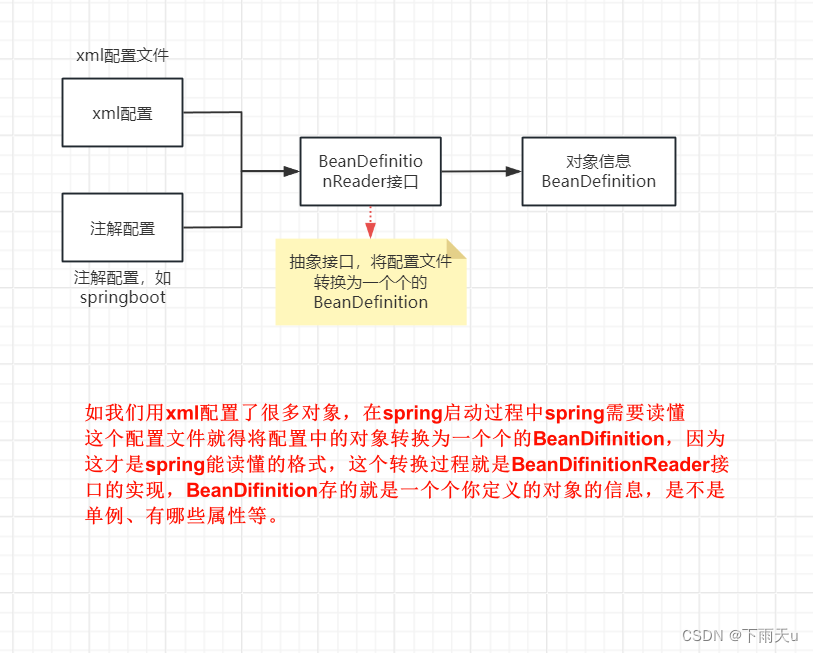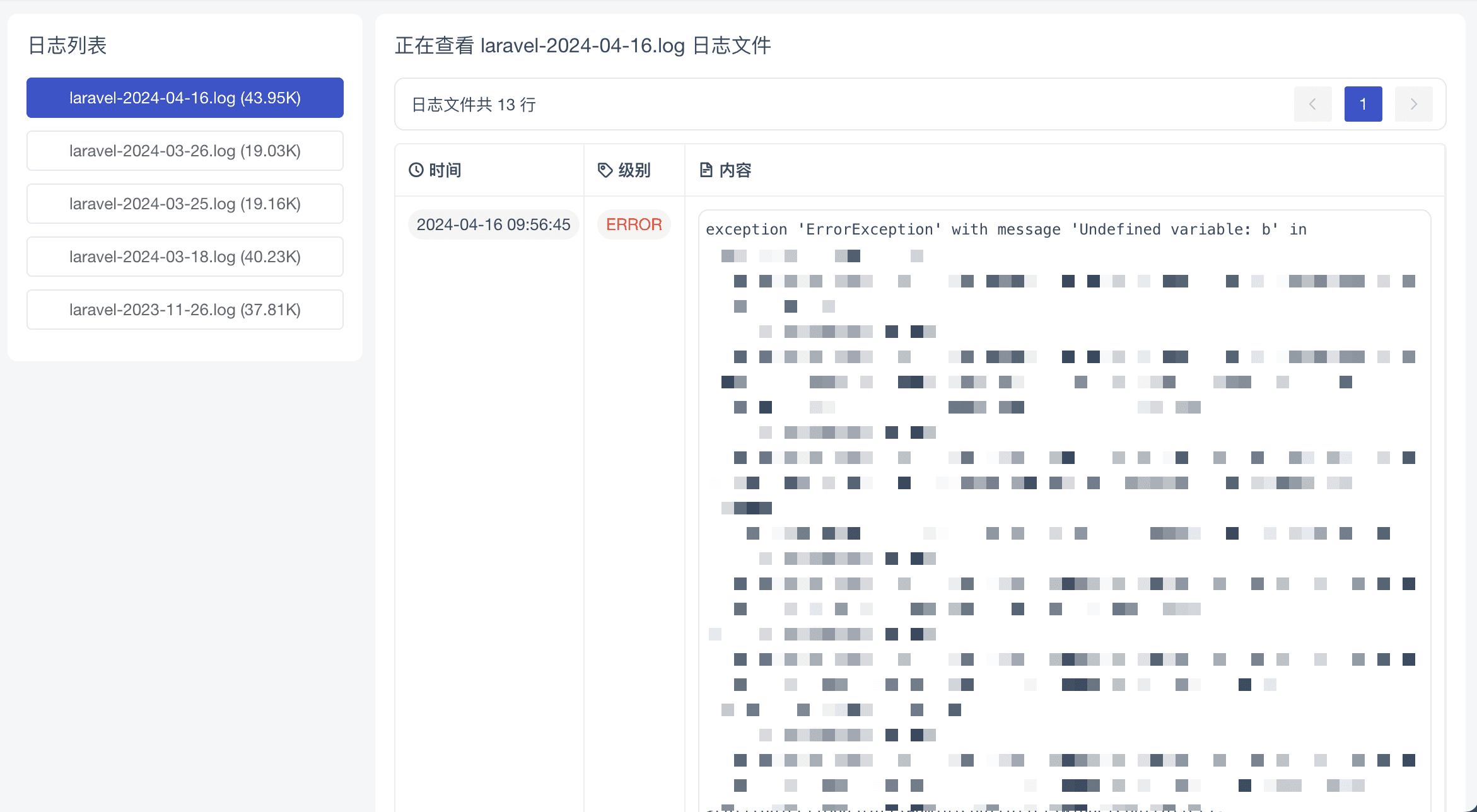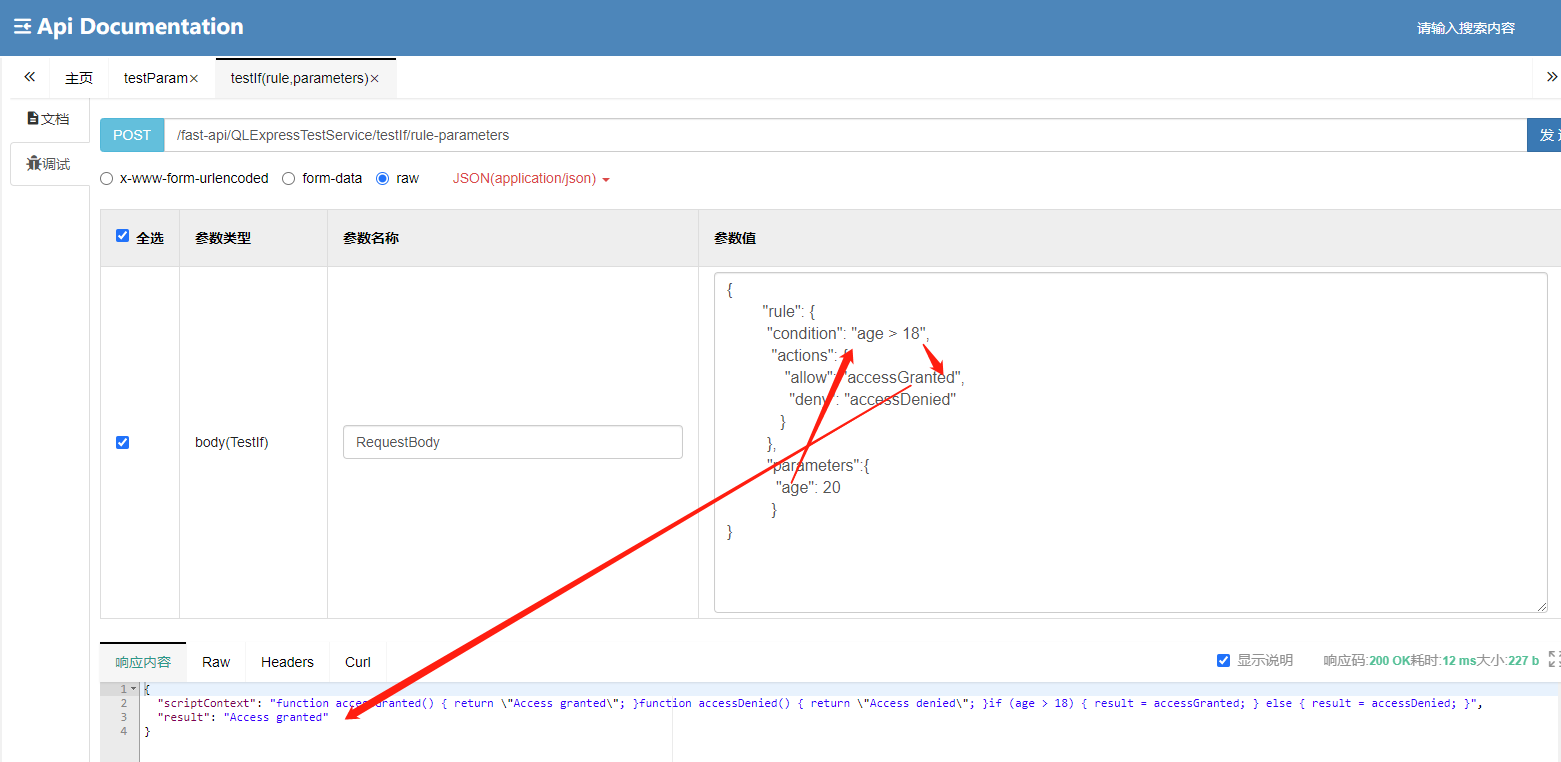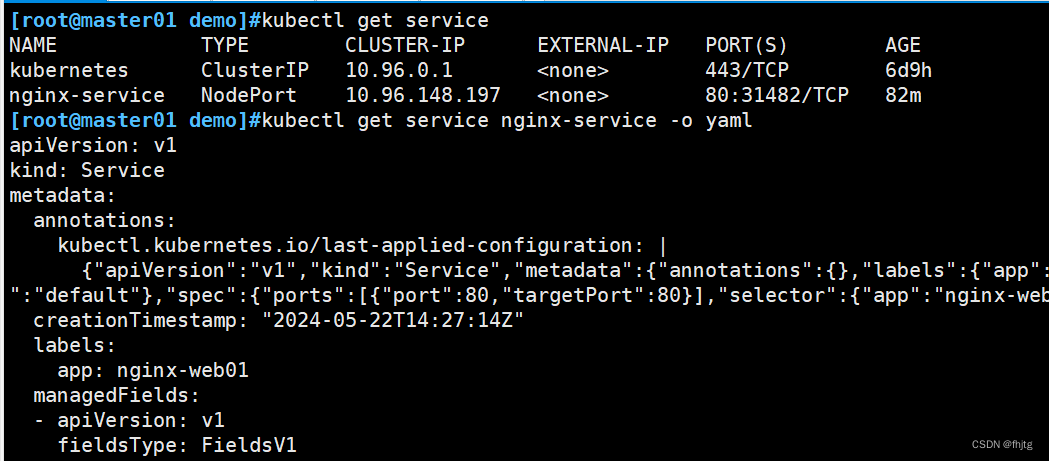BeanDefinition接口
BeanDefinition 描述一个 Bean 实例,这个实例有哪些属性值、构造函数以及一些其他信息,就是描述Bean实例的信息。
BeanDefinition是一个接口,允许BeanFactoryPostProcessor 内省和修改属性值和其他 Bean 元数据。
点击了解BeanFactoryPostProcessor
意义

在spring流程中是现有BeanDefinition再有bean,bean是根据BeanDefinition中的信息去创建的,当然在还没创建bean的时候还可以修改BeanDefinition中的信息,这个就是BeanFactoryPostProcessor 接口的主要功能,如我们在xml中定义的${jdbc.name}最终替换为真正的值就是在实现BeanFactoryPostProcessor 接口完成的。
源码
package org.springframework.beans.factory.config;
import org.springframework.beans.BeanMetadataElement;
import org.springframework.beans.MutablePropertyValues;
import org.springframework.core.AttributeAccessor;
import org.springframework.core.ResolvableType;
import org.springframework.lang.Nullable;
/**
* A BeanDefinition describes a bean instance, which has property values,
* constructor argument values, and further information supplied by
* concrete implementations.
*
* <p>This is just a minimal interface: The main intention is to allow a
* {@link BeanFactoryPostProcessor} to introspect and modify property values
* and other bean metadata.
*
* @author Juergen Hoeller
* @author Rob Harrop
* @since 19.03.2004
* @see ConfigurableListableBeanFactory#getBeanDefinition
* @see org.springframework.beans.factory.support.RootBeanDefinition
* @see org.springframework.beans.factory.support.ChildBeanDefinition
*/
public interface BeanDefinition extends AttributeAccessor, BeanMetadataElement {
/**
* Scope identifier for the standard singleton scope: {@value}.
* <p>Note that extended bean factories might support further scopes.
* @see #setScope
* @see ConfigurableBeanFactory#SCOPE_SINGLETON
*/
String SCOPE_SINGLETON = ConfigurableBeanFactory.SCOPE_SINGLETON;
/**
* Scope identifier for the standard prototype scope: {@value}.
* <p>Note that extended bean factories might support further scopes.
* @see #setScope
* @see ConfigurableBeanFactory#SCOPE_PROTOTYPE
*/
String SCOPE_PROTOTYPE = ConfigurableBeanFactory.SCOPE_PROTOTYPE;
/**
* Role hint indicating that a {@code BeanDefinition} is a major part
* of the application. Typically corresponds to a user-defined bean.
*/
int ROLE_APPLICATION = 0;
/**
* Role hint indicating that a {@code BeanDefinition} is a supporting
* part of some larger configuration, typically an outer
* {@link org.springframework.beans.factory.parsing.ComponentDefinition}.
* {@code SUPPORT} beans are considered important enough to be aware
* of when looking more closely at a particular
* {@link org.springframework.beans.factory.parsing.ComponentDefinition},
* but not when looking at the overall configuration of an application.
*/
int ROLE_SUPPORT = 1;
/**
* Role hint indicating that a {@code BeanDefinition} is providing an
* entirely background role and has no relevance to the end-user. This hint is
* used when registering beans that are completely part of the internal workings
* of a {@link org.springframework.beans.factory.parsing.ComponentDefinition}.
*/
int ROLE_INFRASTRUCTURE = 2;
// Modifiable attributes
/**
* Set the name of the parent definition of this bean definition, if any.
*/
void setParentName(@Nullable String parentName);
/**
* Return the name of the parent definition of this bean definition, if any.
*/
@Nullable
String getParentName();
/**
* Specify the bean class name of this bean definition.
* <p>The class name can be modified during bean factory post-processing,
* typically replacing the original class name with a parsed variant of it.
* @see #setParentName
* @see #setFactoryBeanName
* @see #setFactoryMethodName
*/
void setBeanClassName(@Nullable String beanClassName);
/**
* Return the current bean class name of this bean definition.
* <p>Note that this does not have to be the actual class name used at runtime, in
* case of a child definition overriding/inheriting the class name from its parent.
* Also, this may just be the class that a factory method is called on, or it may
* even be empty in case of a factory bean reference that a method is called on.
* Hence, do <i>not</i> consider this to be the definitive bean type at runtime but
* rather only use it for parsing purposes at the individual bean definition level.
* @see #getParentName()
* @see #getFactoryBeanName()
* @see #getFactoryMethodName()
*/
@Nullable
String getBeanClassName();
/**
* Override the target scope of this bean, specifying a new scope name.
* @see #SCOPE_SINGLETON
* @see #SCOPE_PROTOTYPE
*/
void setScope(@Nullable String scope);
/**
* Return the name of the current target scope for this bean,
* or {@code null} if not known yet.
*/
@Nullable
String getScope();
/**
* Set whether this bean should be lazily initialized.
* <p>If {@code false}, the bean will get instantiated on startup by bean
* factories that perform eager initialization of singletons.
*/
void setLazyInit(boolean lazyInit);
/**
* Return whether this bean should be lazily initialized, i.e. not
* eagerly instantiated on startup. Only applicable to a singleton bean.
*/
boolean isLazyInit();
/**
* Set the names of the beans that this bean depends on being initialized.
* The bean factory will guarantee that these beans get initialized first.
* <p>Note that dependencies are normally expressed through bean properties or
* constructor arguments. This property should just be necessary for other kinds
* of dependencies like statics (*ugh*) or database preparation on startup.
*/
void setDependsOn(@Nullable String... dependsOn);
/**
* Return the bean names that this bean depends on.
*/
@Nullable
String[] getDependsOn();
/**
* Set whether this bean is a candidate for getting autowired into some other bean.
* <p>Note that this flag is designed to only affect type-based autowiring.
* It does not affect explicit references by name, which will get resolved even
* if the specified bean is not marked as an autowire candidate. As a consequence,
* autowiring by name will nevertheless inject a bean if the name matches.
*/
void setAutowireCandidate(boolean autowireCandidate);
/**
* Return whether this bean is a candidate for getting autowired into some other bean.
*/
boolean isAutowireCandidate();
/**
* Set whether this bean is a primary autowire candidate.
* <p>If this value is {@code true} for exactly one bean among multiple
* matching candidates, it will serve as a tie-breaker.
* @see #setFallback
*/
void setPrimary(boolean primary);
/**
* Return whether this bean is a primary autowire candidate.
*/
boolean isPrimary();
/**
* Set whether this bean is a fallback autowire candidate.
* <p>If this value is {@code true} for all beans but one among multiple
* matching candidates, the remaining bean will be selected.
* @since 6.2
* @see #setPrimary
*/
void setFallback(boolean fallback);
/**
* Return whether this bean is a fallback autowire candidate.
* @since 6.2
*/
boolean isFallback();
/**
* Specify the factory bean to use, if any.
* This is the name of the bean to call the specified factory method on.
* <p>A factory bean name is only necessary for instance-based factory methods.
* For static factory methods, the method will be derived from the bean class.
* @see #setFactoryMethodName
* @see #setBeanClassName
*/
void setFactoryBeanName(@Nullable String factoryBeanName);
/**
* Return the factory bean name, if any.
* <p>This will be {@code null} for static factory methods which will
* be derived from the bean class instead.
* @see #getFactoryMethodName()
* @see #getBeanClassName()
*/
@Nullable
String getFactoryBeanName();
/**
* Specify a factory method, if any. This method will be invoked with
* constructor arguments, or with no arguments if none are specified.
* The method will be invoked on the specified factory bean, if any,
* or otherwise as a static method on the local bean class.
* @see #setFactoryBeanName
* @see #setBeanClassName
*/
void setFactoryMethodName(@Nullable String factoryMethodName);
/**
* Return a factory method, if any.
* @see #getFactoryBeanName()
* @see #getBeanClassName()
*/
@Nullable
String getFactoryMethodName();
/**
* Return the constructor argument values for this bean.
* <p>The returned instance can be modified during bean factory post-processing.
* @return the ConstructorArgumentValues object (never {@code null})
*/
ConstructorArgumentValues getConstructorArgumentValues();
/**
* Return if there are constructor argument values defined for this bean.
* @since 5.0.2
* @see #getConstructorArgumentValues()
*/
default boolean hasConstructorArgumentValues() {
return !getConstructorArgumentValues().isEmpty();
}
/**
* Return the property values to be applied to a new instance of the bean.
* <p>The returned instance can be modified during bean factory post-processing.
* @return the MutablePropertyValues object (never {@code null})
*/
MutablePropertyValues getPropertyValues();
/**
* Return if there are property values defined for this bean.
* @since 5.0.2
* @see #getPropertyValues()
*/
default boolean hasPropertyValues() {
return !getPropertyValues().isEmpty();
}
/**
* Set the name of the initializer method.
* @since 5.1
*/
void setInitMethodName(@Nullable String initMethodName);
/**
* Return the name of the initializer method.
* @since 5.1
*/
@Nullable
String getInitMethodName();
/**
* Set the name of the destroy method.
* @since 5.1
*/
void setDestroyMethodName(@Nullable String destroyMethodName);
/**
* Return the name of the destroy method.
* @since 5.1
*/
@Nullable
String getDestroyMethodName();
/**
* Set the role hint for this {@code BeanDefinition}. The role hint
* provides the frameworks as well as tools an indication of
* the role and importance of a particular {@code BeanDefinition}.
* @since 5.1
* @see #ROLE_APPLICATION
* @see #ROLE_SUPPORT
* @see #ROLE_INFRASTRUCTURE
*/
void setRole(int role);
/**
* Get the role hint for this {@code BeanDefinition}. The role hint
* provides the frameworks as well as tools an indication of
* the role and importance of a particular {@code BeanDefinition}.
* @see #ROLE_APPLICATION
* @see #ROLE_SUPPORT
* @see #ROLE_INFRASTRUCTURE
*/
int getRole();
/**
* Set a human-readable description of this bean definition.
* @since 5.1
*/
void setDescription(@Nullable String description);
/**
* Return a human-readable description of this bean definition.
*/
@Nullable
String getDescription();
// Read-only attributes
/**
* Return a resolvable type for this bean definition,
* based on the bean class or other specific metadata.
* <p>This is typically fully resolved on a runtime-merged bean definition
* but not necessarily on a configuration-time definition instance.
* @return the resolvable type (potentially {@link ResolvableType#NONE})
* @since 5.2
* @see ConfigurableBeanFactory#getMergedBeanDefinition
*/
ResolvableType getResolvableType();
/**
* Return whether this a <b>Singleton</b>, with a single, shared instance
* returned on all calls.
* @see #SCOPE_SINGLETON
*/
boolean isSingleton();
/**
* Return whether this a <b>Prototype</b>, with an independent instance
* returned for each call.
* @since 3.0
* @see #SCOPE_PROTOTYPE
*/
boolean isPrototype();
/**
* Return whether this bean is "abstract", that is, not meant to be instantiated
* itself but rather just serving as parent for concrete child bean definitions.
*/
boolean isAbstract();
/**
* Return a description of the resource that this bean definition
* came from (for the purpose of showing context in case of errors).
*/
@Nullable
String getResourceDescription();
/**
* Return the originating BeanDefinition, or {@code null} if none.
* <p>Allows for retrieving the decorated bean definition, if any.
* <p>Note that this method returns the immediate originator. Iterate through the
* originator chain to find the original BeanDefinition as defined by the user.
*/
@Nullable
BeanDefinition getOriginatingBeanDefinition();
}
| 方法签名 | 中文解释 |
|---|---|
| void setParentName(@Nullable String parentName) | 设置该 bean 定义的父定义的名称(如果有)。 |
| @Nullable String getParentName() | 返回该 bean 定义的父定义的名称(如果有)。 |
| void setBeanClassName(@Nullable String beanClassName) | 指定该 bean 定义的 bean 类名称。 |
| @Nullable String getBeanClassName() | 返回该 bean 定义的当前 bean 类名称。 |
| void setScope(@Nullable String scope) | 重写该 bean 的目标范围,指定新的范围名称。 |
| @Nullable String getScope() | 返回该 bean 当前目标范围的名称,或如果尚不清楚则返回 null。 |
| void setLazyInit(boolean lazyInit) | 设置该 bean 是否应延迟初始化。 |
| boolean isLazyInit() | 返回该 bean 是否应延迟初始化,即不在启动时急切实例化。仅适用于单例 bean。 |
| void setDependsOn(@Nullable String… dependsOn) | 设置该 bean 依赖于初始化的 bean 的名称。 |
| @Nullable String[] getDependsOn() | 返回该 bean 依赖的 bean 名称。 |
| void setAutowireCandidate(boolean autowireCandidate) | 设置该 bean 是否是某些其他 bean 自动装配的候选者。 |
| boolean isAutowireCandidate() | 返回该 bean 是否是某些其他 bean 自动装配的候选者。 |
| void setPrimary(boolean primary) | 设置该 bean 是否是主要自动装配候选者。 |
| boolean isPrimary() | 返回该 bean 是否是主要自动装配候选者。 |
| void setFallback(boolean fallback) | 设置该 bean 是否是后备自动装配候选者。 |
| boolean isFallback() | 返回该 bean 是否是后备自动装配候选者。 |
| void setFactoryBeanName(@Nullable String factoryBeanName) | 指定要使用的工厂 bean(如果有)。这是调用指定工厂方法的 bean 的名称。 |
| @Nullable String getFactoryBeanName() | 返回工厂 bean 名称(如果有)。 |
| void setFactoryMethodName(@Nullable String factoryMethodName) | 指定工厂方法(如果有)。此方法将使用构造函数参数调用,或者如果没有指定参数则不带参数调用。 |
| @Nullable String getFactoryMethodName() | 返回工厂方法(如果有)。 |
| ConstructorArgumentValues getConstructorArgumentValues() | 返回该 bean 的构造函数参数值。返回的实例可以在 bean 工厂后处理期间进行修改。 |
| boolean hasConstructorArgumentValues() | 返回是否定义了该 bean 的构造函数参数值。 |
| MutablePropertyValues getPropertyValues() | 返回应用于该 bean 的新实例的属性值。返回的实例可以在 bean 工厂后处理期间进行修改。 |
| boolean hasPropertyValues() | 返回是否为该 bean 定义了属性值。 |
| void setInitMethodName(@Nullable String initMethodName) | 设置初始化方法的名称。 |
| @Nullable String getInitMethodName() | 返回初始化方法的名称。 |
| void setDestroyMethodName(@Nullable String destroyMethodName) | 设置销毁方法的名称。 |
| @Nullable String getDestroyMethodName() | 返回销毁方法的名称。 |
| void setRole(int role) | 设置该 BeanDefinition 的角色提示。 |
| int getRole() | 获取该 BeanDefinition 的角色提示。 |
| void setDescription(@Nullable String description) | 设置该 bean 定义的人类可读描述。 |
| @Nullable String getDescription() | 返回该 bean 定义的人类可读描述。 |
| ResolvableType getResolvableType() | 返回基于 bean 类或其他特定元数据的可解析类型。 |
| boolean isSingleton() | 返回此 bean 是否为单例,所有调用都返回单个共享实例。 |
| boolean isPrototype() | 返回此 bean 是否为原型,每次调用返回一个独立的实例。 |
| boolean isAbstract() | 返回此 bean 是否为抽象,即不是用于实例化自身,而是作为具体子 bean 定义的父类。 |
| @Nullable String getResourceDescription() | 返回该 bean 定义的资源描述(用于在出现错误时显示上下文)。 |
| @Nullable BeanDefinition getOriginatingBeanDefinition() | 返回原始的 BeanDefinition,如果没有则返回 null。 |



